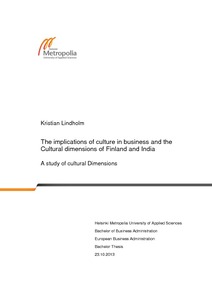Future of Cultural Management in Finland : the perspective of non-Finns on cross-cultural leadership and management in Finland
Choi, Kyungsun (2024)
Choi, Kyungsun
2024
All rights reserved. This publication is copyrighted. You may download, display and print it for Your own personal use. Commercial use is prohibited.
Julkaisun pysyvä osoite on
https://urn.fi/URN:NBN:fi:amk-2024060420934
https://urn.fi/URN:NBN:fi:amk-2024060420934
Tiivistelmä
This study investigates the dynamics of cross-cultural management in the context of Finnish workplaces, analyzing the experiences and perceptions of both international workers and Finnish managers.
This thesis is based on the theories of Geert Hofstede's Cultural Dimensions and the Cultural Competence of Leaders. These theories aid in understanding cultural differences and improving cross-cultural communication. Additionally, the thesis highlights cross-cultural training in Finnish companies to enhance employees' understanding of diverse cultures and underscores the importance of continuous learning for Finnish leaders to effectively manage multicultural teams. Through qualitative interviews with three international workers and two Finnish managers, spanning various industries, the study explores themes of cultural awareness, conflict resolution, and organizational practices. Participants explain their own experiences, where some report positive interactions with Finnish managers, while others encounter initial challenges in communication and cultural adaptation. Perceptions of Finnish culture vary among participants, with some stereotypes aligning with expectations while others diverge. A notable finding is the absence of comprehensive cultural training programs in many organizations, underscoring the need for improved cross-cultural management systems. Additionally, the study identifies differences in industries suggesting potential areas for enhancement.
This study highlights the importance of fostering inclusivity and harmony in the workplace through enhanced cultural understanding and proactive leadership initiatives. Future research could explore statistical analyses of the labor market share of foreign-background workers and assess the effectiveness of cross-cultural management strategies across different industries.
This thesis is based on the theories of Geert Hofstede's Cultural Dimensions and the Cultural Competence of Leaders. These theories aid in understanding cultural differences and improving cross-cultural communication. Additionally, the thesis highlights cross-cultural training in Finnish companies to enhance employees' understanding of diverse cultures and underscores the importance of continuous learning for Finnish leaders to effectively manage multicultural teams. Through qualitative interviews with three international workers and two Finnish managers, spanning various industries, the study explores themes of cultural awareness, conflict resolution, and organizational practices. Participants explain their own experiences, where some report positive interactions with Finnish managers, while others encounter initial challenges in communication and cultural adaptation. Perceptions of Finnish culture vary among participants, with some stereotypes aligning with expectations while others diverge. A notable finding is the absence of comprehensive cultural training programs in many organizations, underscoring the need for improved cross-cultural management systems. Additionally, the study identifies differences in industries suggesting potential areas for enhancement.
This study highlights the importance of fostering inclusivity and harmony in the workplace through enhanced cultural understanding and proactive leadership initiatives. Future research could explore statistical analyses of the labor market share of foreign-background workers and assess the effectiveness of cross-cultural management strategies across different industries.
Kokoelmat
Samankaltainen aineisto
Näytetään aineisto, joilla on samankaltaisia nimekkeitä, tekijöitä tai asiasanoja.
-
The implications of culture in business and the Cultural dimensions of Finland and India : A study of cultural Dimensions
Lindholm, Kristian (Metropolia Ammattikorkeakoulu, 2013)The purpose of the thesis is to examine the implications of culture in business. The thesis makes use of the most popular theoretical frameworks in the field, namely the cultural dimensions where data has been chiefly ... -
Role of Culture in Everyday Work Interaction and Adaptation to Russian Environment : Differences in values, culture and business culture Finnish expatriates should be aware of
Vehviläinen, Tarmo (Jyväskylän ammattikorkeakoulu, 2015)This bachelor’s thesis is a study of national cultures, business cultures and business practices differences between Finland and Russia. It was targeted to aid Finnish expatriates already in - or about to move to Russia. ... -
The Role of Cultural Intelligence in Facilitating Tacit Knowledge Sharing in ICT Organisations in Vietnam : exploring the role of motivational cultural intelligence and behavioural cultural intelligence
Nguyen Thi, Van (2024)Vietnam's rapidly growing ICT sector plays a pivotal role in the country's economic development and global integration, attracting a diverse and multicultural workforce. This diversity underscores the importance of cultural ...



